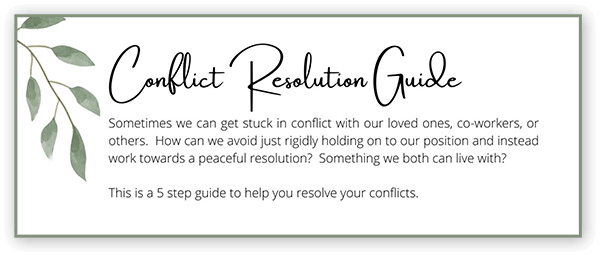In our small church group, the other night, we read words from the book of James in the Bible about what causes quarrels. I will share them in a moment. But, I just want to begin by saying conflicts are constant in life, and yet, they don’t need to be. Over the years, I have discovered a process for how to resolve conflict and how to help others resolve conflict in a biblical way. I want to share it in this post with a print-out of the process for you.
But, first, here are James’ words about the cause of quarrels:
“What causes fights and quarrels among you? Don’t they come from your desires that battle within you? You desire but do not have, so you kill…covet, but you cannot get what you want, so you quarrel and fight. You do not have because you do not ask God. When you ask, you do not receive because you ask with wrong motives, that you may spend what you get on your pleasures.” (James 4:1-3 NIV)
James seems to be saying that our conflict comes from 1) internal struggle with our own desires and motives; 2) wanting what others have; and 3) being disconnected from God who could help with what we need.

What Else Fuels Our Conflicts Today?
I believe James has the source of our conflicts pretty well covered – internal struggles in our hearts about what we want vs. what is right, coveting other people’s lives and things, and being disconnected from God. But, I would add, as I wrote last week, beneath our negative behaviors is fear; fear of being hurt, missing out, losing something, etc.
Further Reading: Psalm 34:4 God Delivered Me From All My Fears
In these times, there is another phenomenon going on that’s been named “Cancel Culture.” Many people, but not all, seem not able to tolerate thought that is different from their own. It seems to be extraordinarily hard for people to have peaceful debate and agree to disagree.
I’m sure we could probably list other reasons for having conflicts. Please share your thoughts on the causes of conflicts in the comments below. But, what we are really hungering for is a way, and for many, a biblical way, to resolve conflict.
How Can We Promote Peace Rather Than Conflict?
Before sharing a process on how to promote conflict resolution in a relationship, it’s important to first think about a “default” way of living as a peacemaker.
The Apostle Paul wrote, “If it is possible, as far as it depends on you, live at peace with everyone.” (Romans 12:18 NIV) When we come to know Christ and then live by His Spirit in us and the principles He taught, chances are we will stir up little conflict.
Now, opposition and rejection may come because of being a Christian, but the kinds of quarrels James spoke about, mentioned above, will not, likely, be coming from us.
Why? Because Jesus taught His followers to turn the other cheek. (Matthew 5:39) Jesus spoke of forgiving others seventy times seven. (Matthew 18:21-22) The Apostle Paul wrote about outdoing one another in showing honor to each other. (Romans 12:10) These attitudes and behaviors lend themselves to peace.
“The fruit of the Spirit is love, joy, peace, patience, kindness, goodness, faithfulness, gentleness, and self-control.” (Galatians 5:22 ESV) With these supernaturally inspired character traits in us, we are humble people who do not tend to provoke others.
A Biblical Conflict Resolution Process
However, even with the fruit of the Spirit growing in your heart because of a relationship with Christ, you still can find yourself in conflict. And, it might be with another believer. Or, it might be with someone who doesn’t believe and then you’re especially challenged to handle the conflict in a gracious way.
So here are 7 steps for handling conflict without “losing your cool.” We don’t want to hide from conflict or avoid it. Sometimes, in fact, many times, we need to address it head on and resolve it. The seven steps are on this printable document and then are explained below it.
#1 Have a mindset of honor towards each other.
As mentioned above, the Apostle Paul wrote about “outdoing one another in showing honor to the other.” (Romans 12:10) The beautiful thing about Christianity is that its whole mindset is one of humility and serving others. Jesus said that He came not to be served but to serve. If we think like this, too, we’ll be wanting to solve problems and listen to others attentively.
#2 Pray before beginning to negotiate.
We cannot pray too much or too often. Asking for the Father’s help to speak kindly, clearly, and to listen well is so appropriate before you begin to try and work things out.
#3 Choose one issue at a time to resolve.
The big mistake so many people make is trying to resolve everything at once. Many married couples who are finding themselves in conflict may begin to go round and round in circles as they talk about children, in-laws, money, and sexual issues, etc., all at once. It’s always best to say, “What do you think about tackling ________ today and leave the rest for another time?”
#4 Let each person speak telling their side of the conflict.
An absolute rule is “don’t butt in!!” When the other person is explaining how they feel and what they’re worried or irritated about, it is so important to remain quiet. You may be itching to make your points and get your view of things out there, but wait. Just listen.
And when you speak, say, “I feel,” or “I think.” Do not be accusatory saying, “You always do this or that,” or “You’re selfish, etc.” Most people are not 100% of the time mean or thoughtless, so don’t accuse them. Stick to explaining your own feelings.
#5 Each person, in turn, should suggest a solution.
Once you’ve aired your grievances, take turns making suggestions about how you could work things out. Again, give the other person “the floor.” Don’t interrupt them. When they’re done, talk about your views on a possible solution.
#6 Choose the solution you both are willing to try.
Among the solutions you both suggest, find one that you are both willing to try and sincerely will try. Set a period of time for trying it. When you reach the end of that period, if now, you are doing well, wonderful! Move on to the next area of conflict and mediate that.
#7 Try out that solution. If not workable, use above again.
If the solution you tried together wasn’t really helpful, then work through the process again and pick a new solution. Give the new solution a try.
I have used this method with so many people – married couples, brothers and sisters, church members. I have used it in my own home and it works.
Things to Remember in Conflict Resolution
Use first person, “I,” to speak about what you are feeling. If you accuse another person saying “You do this,” they will become defensive and further angered.
Keep praying about the conflict and praying about the “beam in your own eye.” Jesus said that we are always more ready to take the tiny speck out of someone else’s eye than remove the beam from our own. (Matthew 7:5) We may need to change our thinking, apologize, be the one to compromise more than we have.
Be an “aggressive listener.” Really listen and pay attention to the other person. Try to read between the lines. Ask the Lord for more empathy and ability to understand where they are coming from.
Finally, a prayer:
Father, in Jesus’ name, help the one reading this to be one of your peacemakers. The world is crying out for us to lessen anger and enmity with one another. Jesus, you asked us to love one another as you loved us. Let it begin with each one of us giving our all to resolving quarrels.
If the one reading is in conflict, help them, Lord, to get free, and find peace in their relationships. In Jesus’ name, Amen
Further Resources:
Finding Healing After You’ve Been Betrayed
A Biblical Guide to Overcoming Envy
If you would like to receive highlighted posts, other faith building materials, and occasional free resources straight to your inbox, please scroll down and sign up for our email list! I would love to share more with you! Blessings!


















These are excellent strategies for conflict resolution. If we listen aggressively and apply all of these other wise strategies, we would come to resolution and minimize conflict. Thank you for bringing your counselor training to this topic, Pam!
Melinda, thank you for stopping by. It is such a challenge to us to really stop and listen to others, especially in this season. “Jumping the gun” and assuming we know the other’s heart is our big mistake. I want to be better at this mediating conflict process myself – and I’m presenting it!!